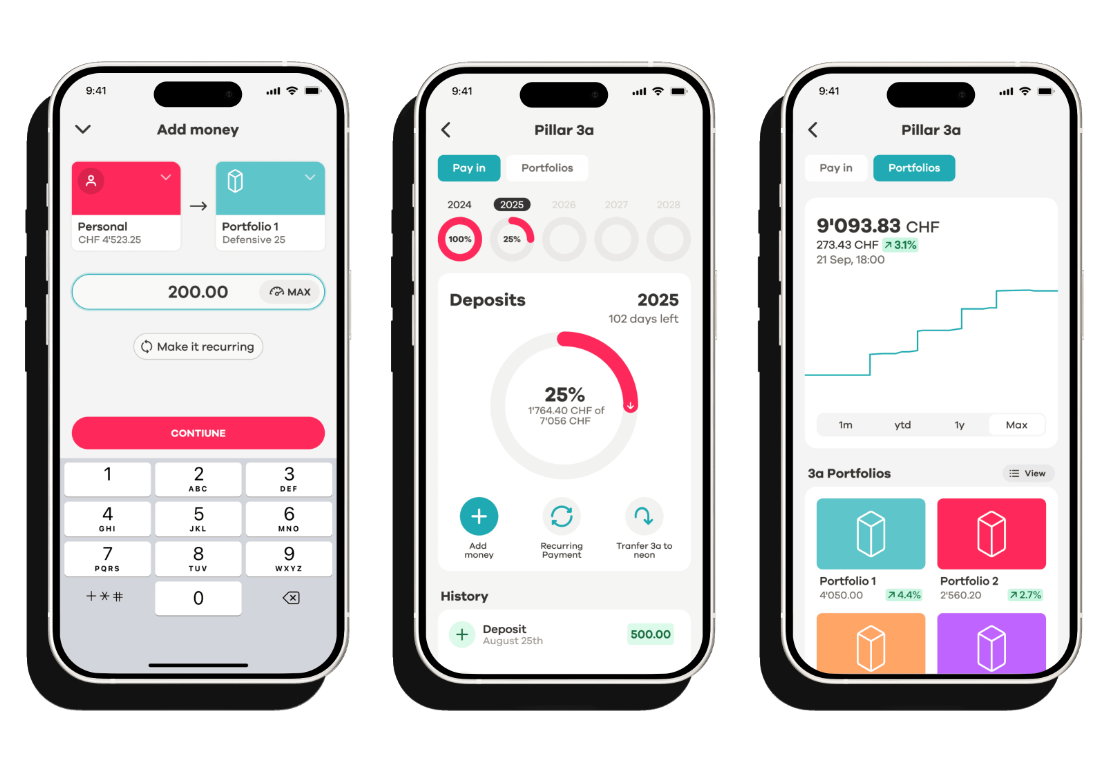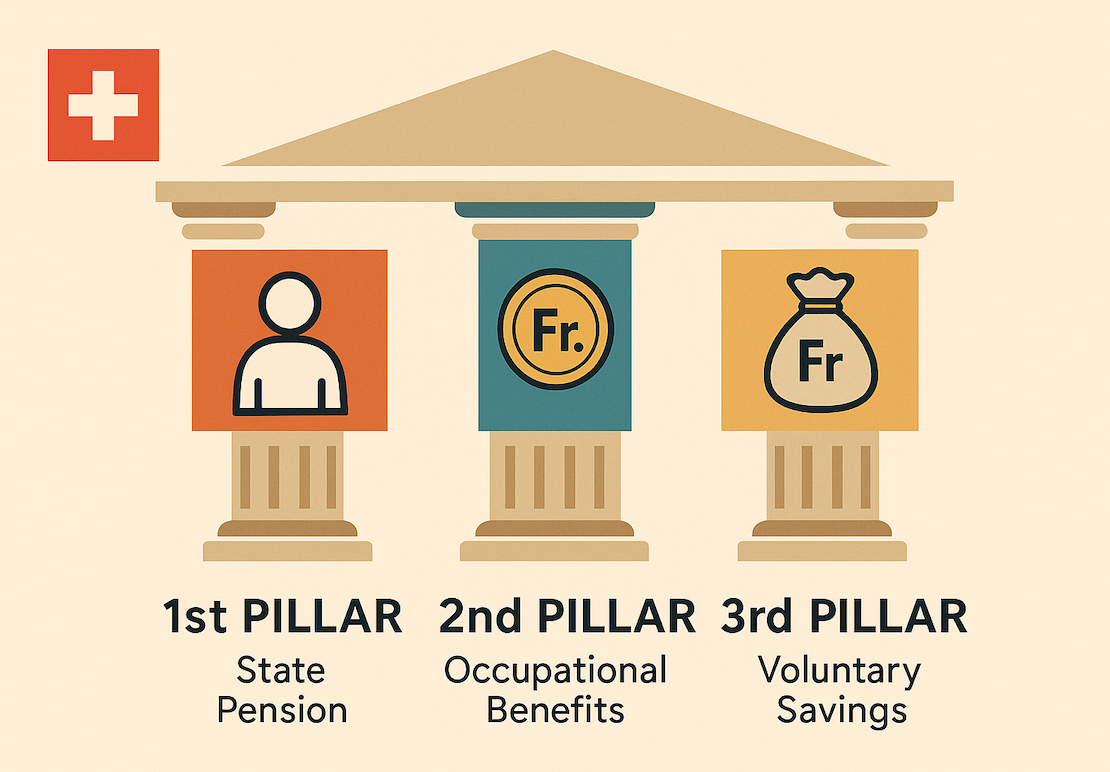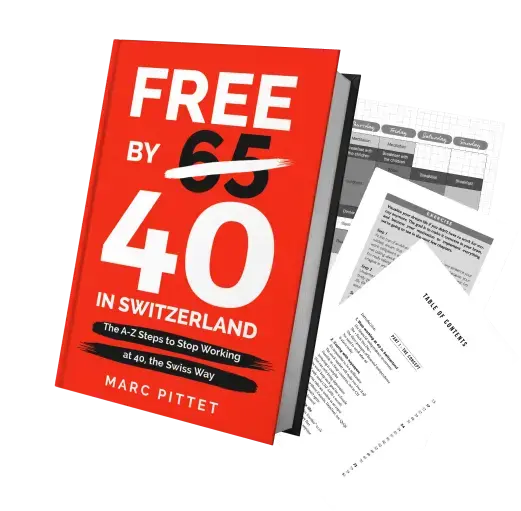After interviewing the founder of Interactive Brokers, I thought I’d have a chat with each of the CEOs or founders of the financial services I use.
Today, it’s the turn of Beat Bühlmann, CEO of finpension.
Thanks again to him for accepting my invitation.
MP video interview with Beat Bühlmann
Here’s the interview with finpension’s CEO:
Important note: you can activate German or French subtitles if they don’t appear automatically.
Video transcript
And if you’d rather read than watch the video, then here’s the transcript of my interview with Beat.
1. Can you introduce yourself to our readers?
Okay, so thank you Mark for having me.
My name is Beat Buhlmann, I’m the founder of finpension.
I’m 40 years old, I’m married, have two kids, two young boys. The older one is six years old, the younger is four and we also have two dogs so I’m quite busy also at home.
If I have free time less your time then I really enjoy running, cycling, so endurance sport is very important to me.
I grew up in Kriens, that’s next to Lucerne. I have two older brothers, they are twins. And I grew up in a neighborhood with a lot of children, so it was for me it was like the perfect setting for playing and learning.
My mother, she stopped working when my older brothers were born. And my father had an optician shop in the city of Lucerne, so he sold and created glasses and contact lenses. But my parents retired in the meantime.
I myself, after the primary and secondary schools, I started a commercial apprenticeship in Lucerne.
Then, I started business administration at the University of Applied Sciences in Lucerne with focus on finance and banking.
And then in 2006 I had the opportunity to join the main group, one of the largest hedge funds to work there. And at that time I then also started the CFA program, the CAIO program, which I finished I think in 2008.
but I lacked a little bit… the opportunity to realize my own ideas.
And then I went back to Lucerne, I got the opportunity to start at a private bank in the area of hedge fund research and portfolio management. So I also there I had a great time, I could learn a lot, so it was very interesting, but I lacked a little bit.
The opportunity to realize my own ideas.
As you can imagine, in an old private bank or in a classical private bank, it’s not a very dynamic environment. So when I made, for example, when I made a proposal to change a process, the feedback I often got was, hey, we did it 20 years like this, so why should we change it? So this is a bit the mindset.
And… I had to make a decision to stay in a, let’s say, let’s call it a golden cage, with a high probability of not being happy over the longer term, or to leave a bit of comfort zone and to work on something I believe 100% and I really enjoy. And this is how finpension started back then in 2015.
You may be also add just one additional point.
You probably wonder, how did I get into finance? I was already, when I was very young, I was interested in financial markets. So I started, I bought my first stocks when I was probably 14 or 15 years old, so very early.
And at that time, there were no online brokers. So you have to imagine, I went to the UBS, I went to a counter, and… the issue was that the transaction costs, they were like 80 francs per transaction.
So this was how it was at that time.
So I still wanted to buy stocks, but the only way to make money, I mean, I had just a small amount to invest. So the only way to make money was to buy penny stocks. But this is how I started with the equity markets.
And a couple of years later, probably or maybe you remember Credit Suisse launched an online broker, U-Trade, so I was very excited about it when this was launched, as the trading costs went down to 40 Swiss francs but it still was high, and then, all the online brokers emerged: Ameritrade, E-Trade, Schwab.
And stock picking now is definitely not part of it.
And this then gave really the opportunity to trade a bit more, to be a bit more active. But I then also learned the whole dot com bubble. So this was my first really meltdown of the markets I remember.
To cut a long story short, or the takeaway for me, it took me a few years also to learn how to invest properly. I paid my learnings, I went through everything. And stock picking now is definitely not part of it.
And I think what really counts over the long term, as you probably all and also your readers know, it’s diversification and it’s the investment horizon. And this is how I invest today.
That’s it. That’s a bit my story.
2. Are you more Zürich Paradenplatz or Geneva water jet?
I would say when it comes to business then Zürich Paradenplatz. I’m a very structured guy and I try to be as efficient as possible always. In leisure time I’m probably more the Geneva water jet :)
3. What’s the book you’ve given most to your acquaintances?
Very honestly I’m a bit bad when it comes to reading but one book I really liked was Principles from Ray Dalio.
And this was the book I last gifted to a friend.
What I changed on my side a bit is that I go running really a lot, so usually five to ten hours per week, and I started listening to podcasts, and this is what I do very often and I really like and I often recommend podcasts to my friends.
So for example, there are a lot of good podcasts around but I really like the podcast of Tim Ferriss, then I like the “All In” podcast and also an entrepreneurial one, the “How You Built This” podcast.
This is what I usually recommend to friends and probably at some point in time there will be more time to read books, but at the moment I really listen to a lot of podcasts.
4. If you could put up a gigantic billboard in the middle of Lucerne, what would it say?
I’m not sure if you can say it in English like this but I will put “Create good habits”.
This is what I try in my everyday life.
Create good habits
One example, we have the office in Lucerne on the fourth floor. In Geneva we have also an office on the fifth or sixth floor. And I never take the lift, so I always go up the stairs and down. And this is one of the habits and I try to integrate it into a routine. And I think it adds up a lot over time.
And integrated into your routine that can be in the area of work, family life, it can be in sports, so it’s everywhere you could do this approach and I think it helps a lot over time.
5. I imagine that your net worth could allow you to retire today (with your finpension shares). Why don’t you?
That’s a very good question.
We have no interest in an exit, because working on the vision we have… together with the team that we have is extremely fulfilling for me.
And it’s really not about money or an exit, it’s all about realizing a vision. And we see still so many opportunities in the banking sector, and we are convinced that we just started the journey with finpension, so there’s a long way to go, and there are very interesting projects ahead.
6. What is your vision of finpension in 5 years?
Good question. I mean, besides business, family would come first, of course.
But for the business, for finpension, I would say that in five years, we have the banking licence.
With a banking license we then also could offer saving accounts or cash accounts for the pillar 3a solution.
Then I would say we have over 10 billion under management. We grow by over 2 billion a year.
And I would also say, the core banking needs we see, there are like four or five core banking needs we identified.
What are all those core banking needs and what do we see as core banking need?
First one is retirement solutions, this is what we already have.
Then, the second one is probably investment solution.
And, third, there is maybe something ahead like savings. So cash accounts is also what you need.
Then, fourth is financing. Mortgages and stuff like this.
And the last one is payments.
So those five areas, they are probably at some point in time on the roadmap.
And I would say in five years we should be able to speak a bit more in detail about those five areas.
7. What do you fear most that could disrupt your business model, and put finpension out of business (like the iPhone and BlackBerry story)?
Not really. I see in individual areas, I see a bit of risk, especially through regulatory interventions.
However, we are already diversified with different offerings that we have, so I don’t see a big disruption for the next couple of years for our business.
8. Do you plan to merge with VIAC one day, to become THE Swiss leader in pension solutions?
It’s a very good question, but I have to say no, probably not.
It’s very good that we have the competition so that we both also push each other for better solutions. This is, in my opinion, extremely important.
And we have to see, as VIAC is partly owned by the Bank WIR. And we see there’s a big advantage to be completely independent from banks and insurance companies.
And…
We know VIAC very well. So we also have exchange from time to time with them.
A few months ago, my co-founder, Ivo and I, we went for dinner with co-founders, with Danny and Christian from VIAC. And by the way, you probably don’t know that. We all know each other really very well and we work together at the same private bank before.
We know VIAC very well. So we also have exchange from time to time with them.
So, Ivo and Christian, my co-founder and one of the founders of VIAC, they are best buddies. So the connections are really very close on a personal level, at least.
However, Ivo and Christian also, they agree that when they meet they don’t talk about business.
We try to completely separate it, but we know each other very well and I think it’s very good that we push each other for a good solution.
Also going forward with new offerings, this is good to have the competition.
9. How do you plan to top the Handelszeitung 3a ranking in 2024?
Very short answer: we just have no influence on that.
10. What is THE thing that still releases intrinsic satisfaction and dopamine in your brain?
Two things: when I spend time with the family and when I do sports. This is very important to me.
I can clear my head during endurance sports or having a family time. This is what I need and gives me the balance I look for.
11. As a successful entrepreneur, what’s the one challenge you’re still facing that you were already facing at the age of 30 or 40?
The first couple of years were extremely intense. I was regularly with over 100 hours of work per week, so it was really tough. And I had two, I would say I had two major challenges.
The first one was my first son was born in 2017.
So, and I was in the middle of building up the company, so I had to somehow balance the family life there with work. And this was not that easy. Yet, it worked out, but it was tough.
And the second one was… This is something also probably a lot of entrepreneurs experience, and this is also maybe a reason why often entrepreneurs fail. You need to have a lot of endurance. Let’s say after two or three years you probably still don’t see an income but you put in a lot of effort into your business, and then you need to put even more effort to achieve a tipping point.
And this is really tough and I think a lot of entrepreneurs quit on that way, but you just have to go through it. And this was in our case also a bit the case.
I myself started in 2015 and at the end of 2017, so after two and a half or three years, we had an income of about 30'000 Swiss francs. And I had to pay also for the co-founder a bit of salary, so this was a tough time. But, we then saw, hey, the business, it works, and we just need to keep on running and pushing even harder. But this is tough at the beginning, especially, so you need to push and push and push.
Compared to today, it changed a lot to be honest.
Now, the work is on a lot of different shoulders. When I started, if there was a problem with the website or so, I had to go up during the night and try to fix it, so I had to take care of everything.
But now, I have all the experts around me and work-life balance is completely different so it’s now that we have a very good setup, with around 25 people now in the company.
So it’s very well established and well organized now.
And work-life balance is also for me, it’s very, very good. I still like, of course, I still like working a lot, but not 100 hours anymore per week. So it’s maybe down to 60 or so, 60, 70.
12. What do you think of the FIRE movement?
So I’m familiar with the FIRE concept, I know it, but to be very honest it’s not for me.
Although I’m an extremely rational person, really, I would probably have trouble with the withdrawal phase, to be honest. My ambition also with what I do with finpension is to build up a sustainable cash flow that always sustain my running costs that I have.
It’s a bit of a different concept, but I probably have a bit of an issue, a mental issue with the withdrawal phase otherwise.
It’s also a kind of FIRE concept that I try to achieve but it’s slightly different.
13. Every time you’ve had to make an important decision (that your brain couldn’t solve on its own), what was your process for getting there?
So, what I try not to do is no emotional decisions.
So, if I have really something important on my desk, then I go to sport or at least sleep on it, so that I can decide the next day.
And, what I always think is very important and what I try to do is I try to listen to the other person, I try to understand the view of the other person, and for finpension or in the case of important decision, I really allow myself the necessary time to make a decision.
And this has paid off several times.
And when it really comes to finpension, for example, when recently, I had a different opinion about a new product than the other team members, than the management team.
Then, I try to understand their view, I don’t try to push something through, because I’m 100% convinced that together we are much stronger. I have a lot of very smart and strong people around me, and so I accept if they disagree with my opinion, I accept it.
If I have really something important on my desk, then I go to sport or at least sleep on it, so that I can decide the next day.
And then we move forward.
And I think this is the way we need to do business. I don’t put myself in a position that I have to decide. So we are a team, and we are much stronger and smarter as a team.
And I’m really very lucky that I have such a smart team around me.
14. Who was your mentor during your years of ascent, from age 20 to 35? Why or why not?
No, I had no direct mentor. Nevertheless, there were always people I looked up to, especially at my previous jobs I had.
There was one guy, he had very good leadership skills. There was another guy, he had very deep research knowledge and I looked up to him.
So, what I tried and I try always is to absorb and learn as much as I can from the different people I admire.
15. Imagine my 10-15 year old daughter standing next to me and boldly asking you: “Hey, Mr. Bühlmann, nice to meet you! I’d like to invest to make my money grow, but… honestly… it’s boring! What strategy would you recommend I follow for the next 20 to 40 years?”
That’s the question I wanted to have. I would say give me a few more weeks and then we can set up the perfect solution for your daughter at finpension :)
16. Would you be up for a fondue in Lucerne in 2024?
Sure, I’m always up for a fondue and a good conversation, of course. Happy to invite you!
17. By the way, what’s your best recommendation for a restaurant in Lucerne (or the surrounding area)?
I like to try out always a bit new things, so also very small restaurants and they make very often make very good experience, but there is one I probably can recommend it’s called FED, so F-E-D.
There is a very creative team behind it, and they offer, it’s like a food sharing concept. So you order a menu, and then it’s put in the center of the table and you can share the food, you can try out, you can taste. So I really like that one and it’s in the city center of Lucerne.
My thoughts from my interview with Beat Bühlmann
Podcasts
If you also like entrepreneurship, I highly recommend the “Acquired.fm” podcast. The two protagonists tell the story of some of the world’s biggest companies, including Berkshire Hathaway and Amazon.
I really enjoy listening to them on long walks. Each episode lasts between 2 and 4 hours, and you never get bored for a second! On the contrary, I ask for more ;)
Or how to combine personal development and health.
Diversification
If you needed further proof that diversification is THE way to long-term wealth, here it is with Beat’s example:
To cut a long story short, or the takeaway for me, it took me a few years also to learn how to invest properly. I paid my learnings, I went through everything. And stock picking now is definitely not part of it.
As he explains, he went through stock picking, lost a lot, and ended up with a boring AND successful portfolio!
If you’re new to the blog, consider yourself lucky, as you’ll be able to save several years on your investment journey. Provided you choose the right investment strategy.
Bet on the future of Swiss banking
While chatting with Beat, I thought I’d make a little bet with nothing at stake.
I bet you that finpension, VIAC and neon will be the leading banks in Switzerland in 10 years’ time.
In 2033, UBS will be dying a slow but sure death, still trying to scrape together a few fees in private banking mode.
There will still be BCV, which will be subsidized by the canton.
But all the other banks will have disappeared, or will be doing something quite different from what we know of their services by 2023 (or at any rate, quite differently).
Talk to you in a decade :D
How do I open a finpension pillar 3a account?
If you’re new to the blog, you’ll find my pillar 3a comparison on this page.
You can use the finpension promo code “MUSTBC” to get a fee credit of 25 Swiss francs (provided you transfer or deposit at least CHF 1'000 in the first 12 months after creating your finpension account).
I’m a finpension customer myself, and only recommend products that I use in real life.
What do you take away from this discussion with the CEO of finpension?





Last updated: December 20, 2023